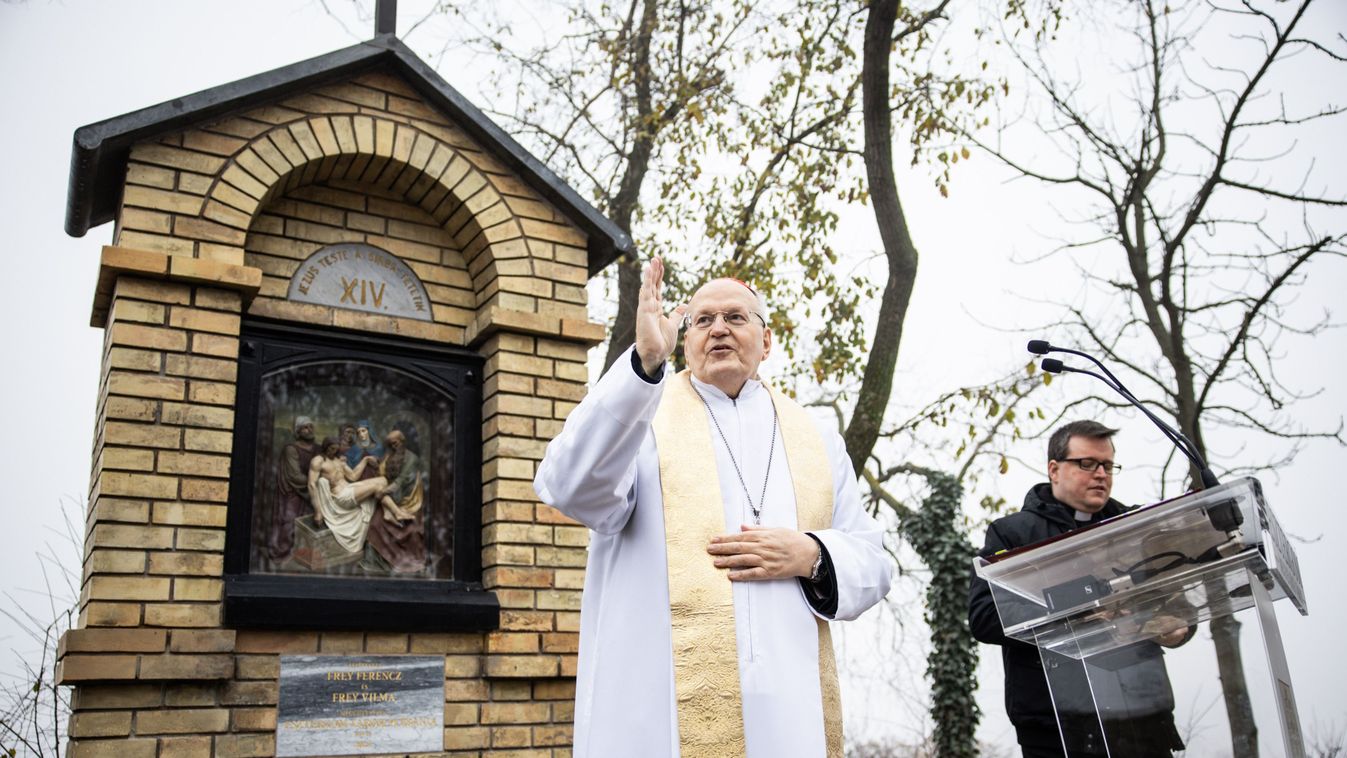Különleges eseményre gyűltek össze a helyiek advent első vasárnapján az esztergomi belvárosi kálváriánál. Az esztergomi családok adományaiból felújított kálváriát Erdő Péter bíboros-érsek, magyar katolikus egyházfő szentelte fel. A bíboros lapunknak nyilatkozva hangsúlyozta: a békére nagy szükség van, különösen most, a mi Európánkban.
Erdő Péter bíboros-érsek, magyar katolikus egyházfő advent első vasárnapja alkalmából a hagyományokhoz híven aranymisét celebrált az esztergomi bazilikában. Ezt követően megáldotta és felszentelte az esztergomi belvárosi kálváriát, amelyet a helyi családok adományaiból és közreműködésével újítottak fel.
Találkozás az Úrral
Szimbolikus jelentősége is van annak, hogy advent első vasárnapján szenteljük fel ezt a kálváriát, hiszen így is készülünk az Úrral való találkozásra karácsonykor és majd húsvétkor is. A húsvéti készületnek ugyanis a színhelye mindig a kálvária, általában nagyböjti pénteken imádkozva, énekelve járják végig itt a keresztutat a hívek – nyilatkozta lapunknak a szentelési ünnepségen a bíboros.
Erdő Péter hozzáfűzte: az adventre sokféleképpen készül az egyház, a plébániák szerte az országban. Szokott lenni például közös gyóntatás, egy-egy templomban nyolc-tíz pap is összejön ilyenkor, hogy elvégezhesse a karácsony előtti gyóntatást. – Az adventi koszorúkat sem csak jelképesen használjuk természetesen, hanem amikor meggyújtjuk rajtuk vasárnaponként a gyertyát, imádkozunk, énekelünk, és ilyenkor szoktunk valamilyen jó feltételt is megfogalmazni – fejtette ki a bíboros. – Van, ahol ez a gyermekekkel közösen zajlik, és ilyenkor kézimunka-foglalkozást is tartunk. Kis inget vágunk ki például papírból, és azt mondjuk, hogy a kis Jézusnak készítjük ezt karácsonyra, ahány segítségnyújtást vagy jó cselekedetet hajtunk végre, annyi keresztet, virágot rajzolunk később az ingre. Ugyanígy van, aki szőnyeget sző színes csíkokkal, hogy a kis Jézus jászola elé terítse – sorolta Erdő Péter. Mint elmondta: ezekkel az adaventi foglalkozásokkal a gyerekek is lassanként ráérezhetnek arra, hogy advent idején olyan valakinek a születésére készülünk, akit nagyon szeretünk, mert ő is nagyon szeret minket. Ez a meghittség jellemzi az adventet.
Belső és külső béke
Az érsek hangsúlyozta:
Nagyon fontos a belső és a külső béke is, hiszen ennek hirdetője volt Krisztus. A Szentírás szerint az angyalok is békességet hirdettek, dicsőséget a mennyben Istennek és békességet a Földön az embernek. Erre van nagy szükség, különösen most, a mi Európánkban, mert a békétlenség nagyon megviseli az emberek testi és lelki egyensúlyát, a testét és lelkét egyaránt.
Emlékeztetett arra, hogy XIV. Leó pápa is mindig a békéről tanít, ahogyan tette nemrég a niceai zsinat 1700. évfordulójához kötődő törökországi látogatása alkalmából, de elutazott a háborútól körülvett Libanonba is azért, hogy a béke jele legyen. – Azt hiszem, hogy csatlakoznunk kell hozzá itt, Európában is, szívvel-lélekkel – mondta a bíboros. Hernádi Ádám esztergomi polgármester és az önkormányzat tájékoztatása szerint az Erdő Péter által tegnap felszentelt kálvária sorsát hosszú idő után 2024 elejére tudta jogilag rendezni Esztergom városa, így a stációépítmények városi tulajdonba kerülhettek.
Örökbefogadás és donáció
Az első építtetők szándékának felélesztésével a stációk örökbefogadását hirdette meg Esztergom önkormányzata, és rendkívül hamar összegyűltek az adományok. Családok, városi és egyházi közösségek és magánszemélyek tették lehetővé a felújítást, amelynek összköltsége elérte a harmincmillió forintot.
A helyreállítást megelőzően valamennyi építményről egyedi dokumentáció készült, diagnosztikai vizsgálatokkal, részletes állapotfelméréssel. A vasból készült üvegezett betétek a bennük lévő domborművekkel restaurátorműhelybe kerültek, és tisztítás után eredeti formájukban újultak meg. Az első állomás ellopott domborművéről csak kevés és rossz minőségű fotó maradt fenn, ezek digitális tisztítása után szobrászművész segítségével rekonstruálták a jelenetet, amelyet az eredeti mintájára készített el az alkotó. A domborművek tisztítását és restaurálását végző festőrestaurátor művészek festették ki az új domborművet. A fémtartókba rétegelt üvegezés került, így a stációk visszakapták eredeti megjelenésüket. A sérült idomtéglákat utángyártott elemekkel javították, pótolták. Az eredetileg fémlemez fedéseket műkőből készítették el, a rajtuk lévő kereszttel együtt.
Márványtáblák az adakozóknak
A stációfeliratokat szintén restaurátorok újították fel, a stációk lábazata fölé új, aranyozott feliratú márványtáblák kerültek az eredeti építtetők és a felújítást támogatók nevével.
Egy pályázatnak köszönhetően az út mentén világítást építettek ki kandeláberekkel, és minden egyes stáció domborműve belső, rejtett LED-es világítást is kapott. A stációk végén, a hegytetőn álló kápolna díszkivilágításával mára már sötétedés után is messziről láthatóvá teszi Esztergom megújult ékességét, a „Magyar Sionnal” szemközt emelkedő hegyet és szakrális helyet, amely hosszú idő után így ismét a turisták által is kedvelt sétánnyá változott.
Az önkormányzattól megtudtuk azt is, hogy a felújítás is elnyerte az Év Háza Komárom-Esztergom Vármegyében díjat 2025-ben.

